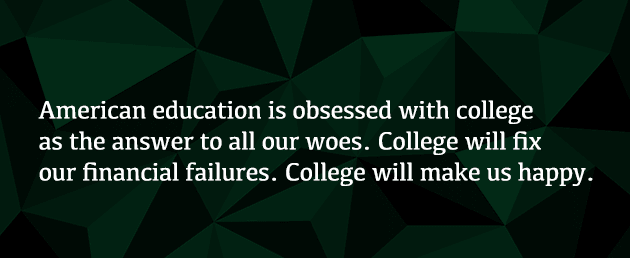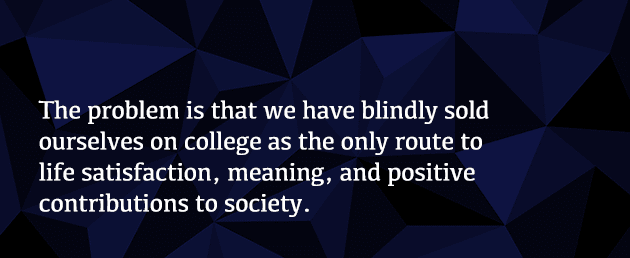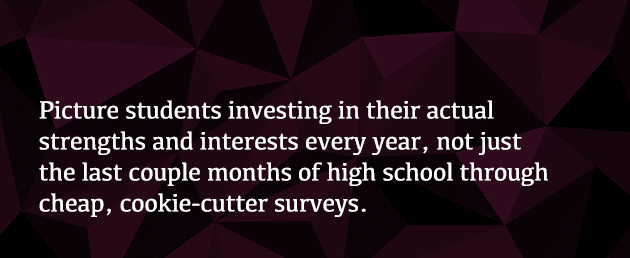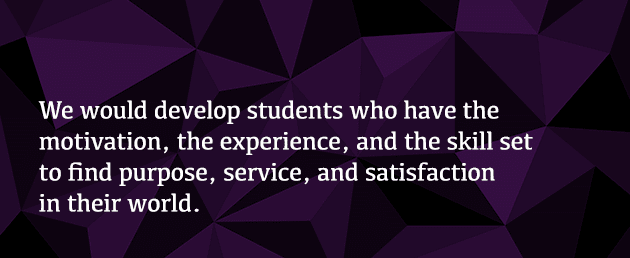American education has a faith problem. No, I’m not talking about the debates about religion and to what extent it influences schools. I’m talking about the blind, unquestioning faith we have to the god of educational purpose: College.
American education is obsessed with college as the answer to all our woes.

College will fix our financial failures. College will make us happy. It will give us a sense of purpose. True: College graduates do gain a host of benefits. But, we are so fixated on just getting kids to college, we don’t often ask why and for what purpose. We are lemmings leading learners to a shaky promise that as long as they just get to college, life will be okay.
I’ve seen firsthand how our blind allegiance to college has impacted thousands of students and hundreds of teachers. We have shoved all our thoughts, our energy, and our concern into getting kids into college. Regardless of whether students are a.) emotionally, socially, and academically ready for college or b.) interested in college.
I see the results of this blind focus.
I see it when I speak to hundreds of students each year who believe their entire life depends on getting into the “perfect” college by a prescribed date. And I see these same students disregarding their actual learning, putting their energy into “GPA boosters,” and taking classes that look good to colleges, though they hate the content and would rather be taking classes that are meaningful and allow them to enhance their talents.
I see the college obsession as I watch districts across the U.S. spend hours, days, weeks focused on surface level improvements for high stakes tests, with never a conversation about what is intellectually best for real student learning. And I see this obsession manifest in eliminated electives and trades classes. Instead, schools look to pack A.P. and college-level courses with bodies, no matter how much these classes may fall beyond a student’s skill set.
Most of all, I see the results of this blind faith in my former students who express their misery in college, pursuing degrees they don’t actually want, racking up tens of thousands of dollars in debt, and sometimes dropping out, feeling less motivated and self-confident than when they began.
The problem is that we have blindly sold ourselves on college as the only route.

The problem with American education is not that we see college as a route for life satisfaction, meaning, and service. We should discuss with students the many benefits of going to college (beyond earnings and employment, which are about the only reasons I hear brought up in schools). The problem is that we have blindly sold ourselves on college as the only route to life satisfaction, meaning, and positive contributions to society.
What if we reminded ourselves that college is simply one means to an end? And, what if we actually based our K-12 education around the actual “ends” of life satisfaction—the habits, experiences, and practices that contribute to altruism, meaning, and accomplishment? How could such an education create thriving students and enhance their post-secondary experiences?
Researchers and educators have learned a lot about what improves one’s well-being in both subjective and objective ways. Yet, schools have barely touched these ideas, clinging instead to the same traditional formulas for preparing students for life beyond high school.
Imagine if we taught life satisfaction directly.

You may be picturing a bunch of hippy, heartfelt lessons where kids sit in circles huffing incense, chanting self-help mantras, and boosting their self-centeredness. But, that’s far from the potential contained within an educational system that teaches true well-being.
Picture students learning concepts of engagement and investing more in their actual strengths and interests every year, not just the last couple months of high school through cheap, cookie-cutter surveys. To quote one of my students, “It’s really disappointing when the results of a career survey tell you that your only job matches are funeral director and garbage man.” Imagine students being given ample networking opportunities to job shadow and connect frequently with real careers.
Think about students building mindful habits that allow them to focus their attention on problems and tasks, to manage their own stress and emotions, and to be present in the classroom rather than needing the instant gratification of a social media alert.
Visualize a student given time and coaching to develop long-term goals that matter to him or her.

And practicing research-tested strategies for setting, evaluating, and accomplishing these goals. Imagine if students understood how every element of their education helped contribute to their intrinsic, long-term goals. Because, I can tell you that, “You’ll need this when you get to college” is not cutting it as a motivator.
Consider if students were allowed the freedom and support to research real problems in their world, and then allowed to collaborate and fulfill problem-based projects to influence these issues. What if we took students into the community to serve, helping them learn firsthand the powerful effect of altruism.
Imagine if we taught the psychology of resilience (rather than just the definition) and provided safe opportunities for students to learn from their mistakes, rather than berate them, punish them, and remove them when they fail.
Most of all, picture a system in which these concepts are woven into every thread of a student’s education, instead of just being mini-lessons that we’ll get to if we finish “covering” some Common Core content. We would educate students beyond being “ready” for college. We would develop students who have the motivation, the experience, and the skill set to find purpose, service, and satisfaction in their world.
These images of a new educational paradigm are far from utopian.
I’ve seen these moments of thriving. But these moments are not a natural by-product of a system that worships college as the fix for languishing learners. These moments are made intentionally when educators teach the “ends” of well-being directly, while highlighting the many “means” to this end, including college.
Over the next few months, I’ll be sharing everything a teacher needs to make concepts like positive emotion, mindfulness, resilience, purpose, and empathy an essential part of their classrooms. Look for the Thriving Learner series here and at AffectiveLiving.com for the research, the lessons, and the learnings that will help students thrive now, in their post-secondary, and beyond. In the meantime, consider: What is your main event in your classroom? Do you seek to simply get students ready for college? Or, do you seek to help students better experience life? Your answer matters.
